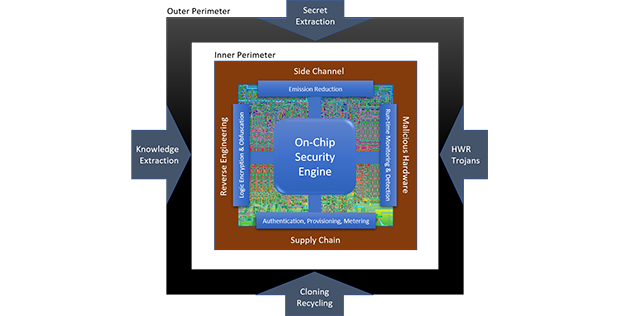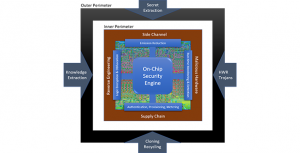Florida Institute for Cybersecurity (FICS) Research has announced a collaboration with the Defense Advanced Research Projects Agency (DARPA) on a program called Automated Implementation of Secure Silicon (AISS). Leading electronic design automation company Synopsys will serve as a prime contractor on the program. The $7.8M grant, part of the DARPA Electronic Resurgence Initiative (ERI), has the broad goal of making scalable on-chip security pervasive throughout industry and military applications.
As the program description outlines,
The objective of the program is to develop a design tool and IP ecosystem – including tool vendors, chip developers, IP licensers, and the open source community – that will allow security to be inexpensively incorporated into chip designs with minimal effort and expertise, ultimately making scalable on-chip security ubiquitous.
The Team
Seven UF faculty members will be involved in the project, with Dr. Mark Tehranipoor as the lead Principal Investigator. All are members of FICS Research.
| Faculty Member | Affiliation |
|---|---|
| Mark Tehranipoor (Lead PI) | ECE |
| Christophe Bobda | ECE |
| Farimah Farahmandi | ECE |
| Domenic Forte | ECE |
| Yier Jin | ECE |
| Prabhat Mishra | CISE |
| Fahim Rahman | ECE |
The AISS program will be structured as a unique partnership between industry, academia, and government. Synopsys, due to its industry-leading position as an EDA tool/IP provider, will serve as a prime contractor on the AISS program. FICS Research will serve as the primary academic partner on the Synopsys lead team. Key subcontracting partners with Synopsys include: Arm, Boeing, UltraSoC, UC San Diego, Purdue University, and Texas A&M.
The Background
In June of 2017, the DARPA Microsystems Technology Office (MTO) announced a new Electronic Resurgence Initiative (ERI) to ensure far-reaching improvements in electronics performance well beyond the limits of traditional scaling. As silicon fabrication continues its move overseas, the need to create a secure, trustworthy chip fabrication supply chain for industry and military use has become more critical than ever.
DARPA kicked off the ERI with six programs aligned to three thrust areas under the first phase of ERI.
- The Materials and Integration thrust asked whether the integration of unconventional materials could enhance conventional silicon circuits
- The Architectures thrust asked whether the electronics community could enjoy the benefits of specialized circuitry while still relying on general programming constructs through the proper software/hardware co-design.
- The Designs thrust asked whether the electronics community could dramatically lower the barriers to modern system-on-chip design and unleash a new era of circuit and system specialization and innovation.


